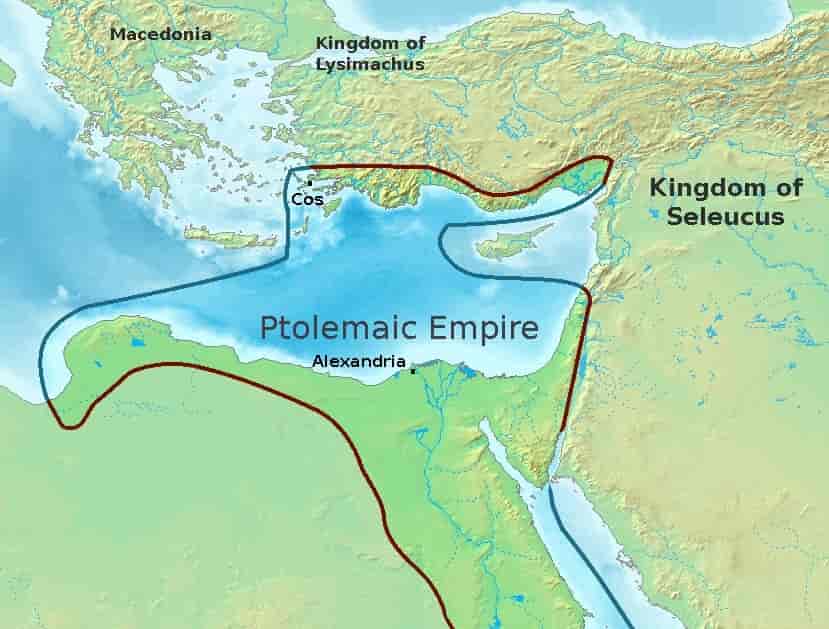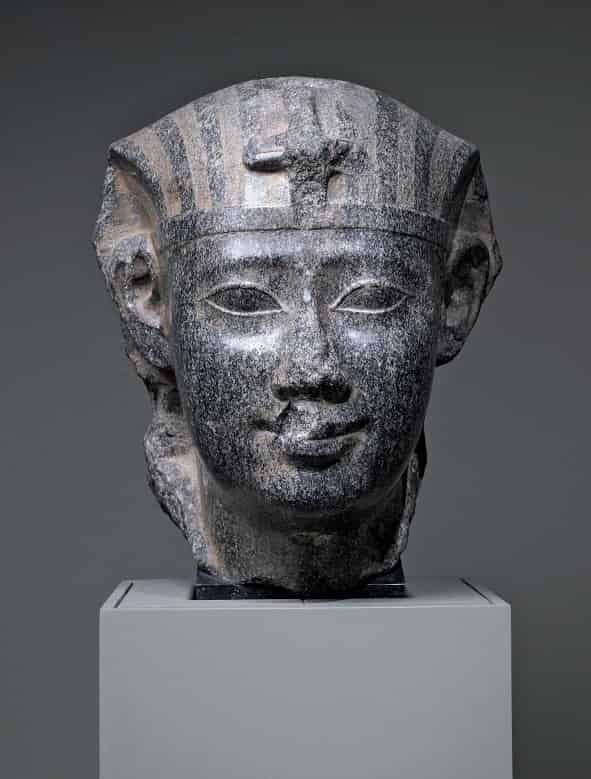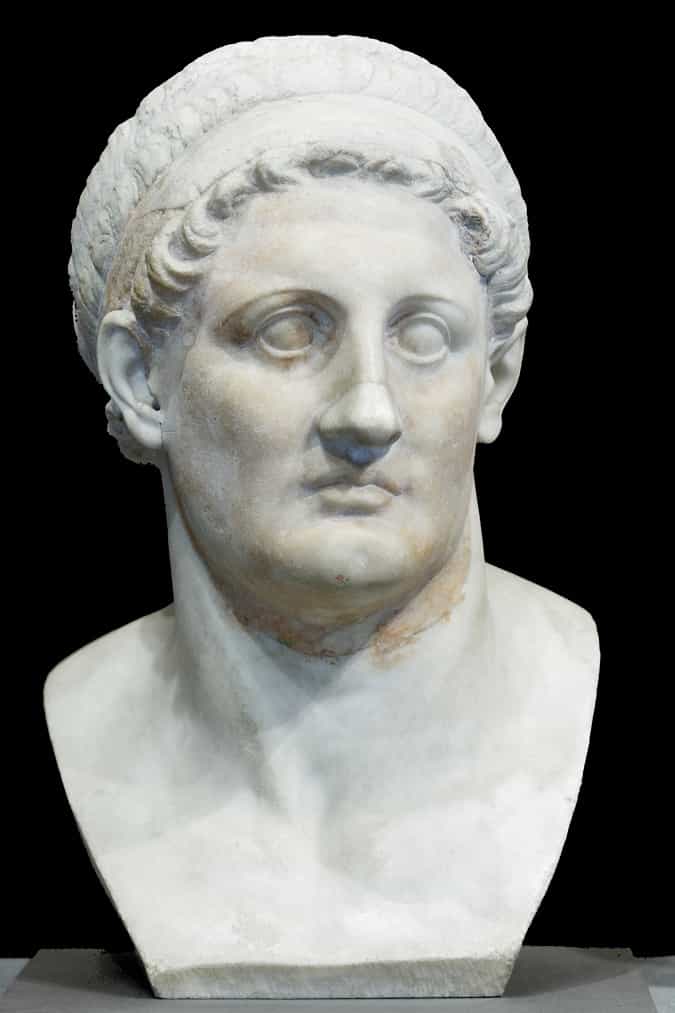When Alexander the Great arrived in Egypt in the course of his war against the Persians he was greeted as a deliverer. The yoke that the Second Persian Domination had imposed on the population of the Nile country had lasted for a decade.
The Persians had committed countless atrocities against the Egyptians, especially in the religious sphere, beginning with looting of the temples during the conquest.
When the Macedonian troops arrived in Egypt, the satrap (provincial governor) in command, aware of the military power of the Macedonian, surrendered the territory without fighting. It was the autumn of 332 BC.
Alexander in Egypt
Unlike the satraps, Alexander would carry out a policy respectful of the Egyptian creed and traditions.
He was crowned king of Egypt in the traditional capital, Memphis, receiving the five names as a full-fledged pharaoh.
After this he headed north, where he founded Alexandria. Then he went to the Siwa oasis, seat of a famous oracle of the god Amun, where he was recognized by the god as his son, thus legitimizing his power over the country.
Of course, Alexander was fully aware of the strategic and economic importance of Egypt, and he took great care in choosing the officials who would administer the country during his absence on the continuation of his journey of conquest towards the heart of the Persian Empire.
The command of the army and navy was entrusted to Macedonian officers; some administration functions were entrusted to those born in Egypt.
This done, Alexander leaves in 331 BC from Memphis. He would only return to be buried in Alexandria nine years later.
Successors
After the death of Alexander in Babylon, a good part of his generals prepared to divide up the great Macedonian empire.
Ptolemy reserved for himself Egypt, an important territory for its proverbial agricultural wealth and strategic geographical location, as well as Libya and the immediate Arabian areas of the Nile country.
Soon there was an armed confrontation between the Macedonian leaders who wanted to maintain the unity of the Alexandrian empire and those who chose to separate their domains.
Perdiccas and Antigonus, in the first group, attack without success the province of Ptolemy in two successive waves.
With the defeat of Antigonus at Ipsos and the victory of the Separatists, the Empire was doomed.

Ptolemaic Empire circa 300 BC
A splendid start
Some years before Ipsos, Ptolemy had already made himself king, thus beginning the dynasty of the Lagids (Ptolemaic dynasty).
To legitimize himself, he carried out two actions. In the first place, years before he had diverted Alexander’s corpse as it passed through Damascus, taking it to Alexandria instead of Vergina, the royal Macedonian necropolis.
With the presence in Alexandria of his body, Ptolemy was shown as his political and religious heir.
Second, when he was crowned king, he married a daughter of Nectanebo II, the last indigenous sovereign. Thus, he was not only the natural heir of Alexander, but also the descendant of the last properly pharaonic dynasty.
Ptolemy I inaugurated a first stage of the dynasty characterized, in addition to internal administrative and economic reforms, by an energetic initiative in foreign policy.
His ambitions were directed, on the one hand, to the Greek cities of Asia Minor, and on the other to Syria-Palestine.
For this he created a vast and powerful army (essentially made up of Macedonians and Greeks, with a large mercenary component) and a very large navy.
Ptolemy II elaborated on the politics started by his father. The capital was definitively moved from Memphis to Alexandria, where the construction of its famous lighthouse would be completed and where the museum and library founded by Ptolemy I would know its heyday.
In foreign policy the warlike force is maintained. This phase of bonanza will end with the reign of Ptolemy III, who managed to maintain the military power of Egypt in the eastern Mediterranean.
To the already very complex Egyptian administration are added different newly created positions and new functions with a very specific purpose: to improve agricultural productivity and make the tax system more efficient.
The monarchy needs to gather as many resources as possible to finance its ambitious projects.

The decadence
With Ptolemy IV begins the decline of the powerful kingdom he inherited. Little interested in politics, the king let his prime minister, Sosibius, do.
Antiochus III – king of the Seleucid dynasty, founded in Asia by another of Alexander’s generals – tried to take advantage of this situation by attacking the Egyptian possessions in Syria.
The Egyptian victory at Raphia managed to stop the invaders.
And it is that in Raphia Ptolemy IV was forced to use, for the first time, Egyptians in the infantry, given the small contingent of Greek mercenaries that he could gather.
The victory was seen by the Egyptians as a true national triumph, and not by the foreign king, which gave wings to nationalism and xenophobia towards the Macedonians, phenomena also fueled by the suffocating fiscal pressure.
After the Raphia episode, the Lagids (The Ptolemaic dynasty) will progressively lose their Mediterranean possessions.
Their difficulties in gathering resources to pay for the voluminous mercenary contingent, internal dynastic struggles, and mismanagement are direct causes. In addition, several nationalist revolts broke out in the Delta and Upper Egypt.
In the Thebaid, an independent kingdom of autochthonous pharaohs was even established, which managed to maintain itself for two decades.
To enlist the support of the clergy against the uprising, Ptolemy V relented and was crowned not in Alexandria, but in Memphis, by a clerical synod that would mediate before the insurgents in exchange for extensive privileges, as indicated by the Rosetta stone.
The arbitration of Rome
From their weakened kingdom, the Ptolemaic dynasty watch the shadow of a growing Mediterranean power slowly loom over them: Rome.
This begins to act as a mediator in the different quarrels between the Hellenistic kingdoms. As expected, Rome ends up benefiting from such a position to gain dominance over different regions.
This is what will happen to the role of “guardian” that Egypt grants Rome in its effort to rebuild its once vast kingdom.
A representative example is the case of Ptolemy VI and his brother.
As part of the war against the Seleucid Antiochus IV, says the Greek historian Polybius, a battle took place near Pelusium in which the Egyptians were defeated and Ptolemy VI taken prisoner.
The Egyptians proclaimed the captive’s younger brother king by the name of Ptolemy VII.
A strange situation was created in which two kings reigned simultaneously. When Ptolemy VI was released, tensions arose that led to the division of the kingdom into two parts: Egypt and Cyprus for the older brother, Libya and Cyrene for the younger.
Later Ptolemy VII tried to seize Cyprus, seeking the support of Rome, which he even named it heir to his territories if he died without issue.
However, it was more beneficial to Rome that Cyprus remained in the hands of Ptolemy VI, with which the Senate finally arbitrated in favor of this king.
Ptolemy XII took a step further. By crowning himself as king, he wanted to legitimize himself in the Mediterranean with the consent of the Roman Senate.
Taking advantage of the weakness of Egypt, marked by continuous plots and conspiracies in the royal family itself, Rome will take over the eastern Mediterranean, until it meets Egypt face to face when the daughter of Ptolemy XII, Cleopatra VII, occupies the throne.

Ptolemy I Soter, Louvre
The end
Under the reign of Cleopatra, one attends the swan song of the Ptolemaic kingdom.
With her, Egypt was very close to returning to what it was in its first stage. With that objective, Cleopatra had to negotiate with Rome, obtaining favor first from Julius Caesar (who would be the father of her son Caesarion) and later from Mark Antony (father of her children Alexander Helios and Cleopatra Selene).
For a brief period she managed to recover a good part of the Mediterranean possessions. However, this pitted her against the more conservative faction of Roman society and the Senate.
Led by Octavian, these sectors were reluctant to the idea of the great Hellenistic kingdom that could result from the union of Egypt (Cleopatra) and the eastern part of the Roman possessions (Mark Antony as triumvir, one of the three great magistrates of the Republic) .
These aspirations were truncated with her defeat in the Battle of Actium, won by Octavian. It involved the Roman conquest of Egypt and, more specifically, its integration as a personal possession of the future emperor.
Survival of a culture
Ptolemaic Egypt constitutes one of the most interesting periods not only in the ancient history of Egypt, but also of the Mediterranean.
The contact between two cultures such as the Egyptian and the Greek was not without tensions and rejections on both sides, but at the same time it was a way of enhancing the common aspects and making each other known.
During the Ptolemaic period, the rulers were not Egyptian and the elite became very Hellenized Greek or Egyptian, but the life of the peasant did not change substantially, and the pharaonic culture continued.
With the victory of Octavian, the ancient Egyptian culture continues alive in the religious field. What’s more, it spreads throughout the Empire.
Ancient Egyptian works of art fill the villas of the wealthy patricians, while temples to Isis and Osiris appear in every province. It will not be until the arrival of Christianity when the pharaonic culture finally succumbs.